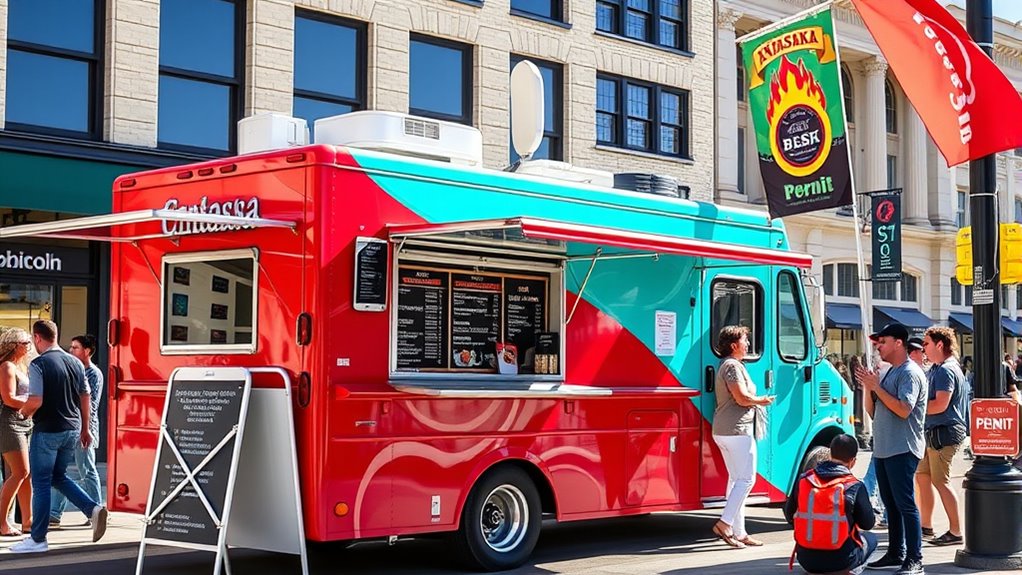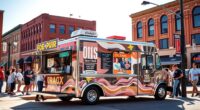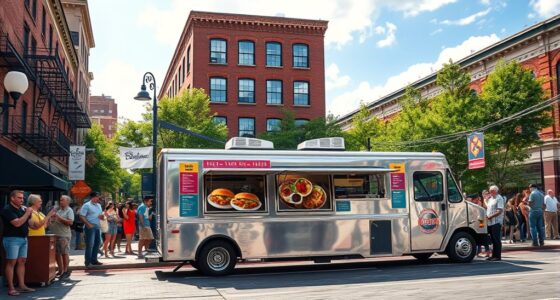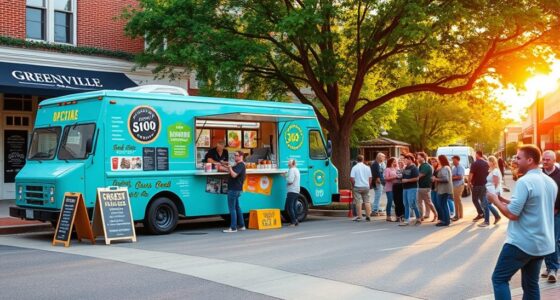To open a food truck in Lincoln, Nebraska, you’ll need permits like a Mobile Food Unit and Food Establishment Permit, along with a Food Protection Manager Certification. Start-up costs range from $85,000 to $175,000, and you’ll face annual rental or purchase expenses. Find legal parking spots in zones B-3 and B-4, ensuring compliance with distance and zoning rules. Developing a compliant menu and employing smart marketing strategies will help your business grow. Keep exploring to learn more about each step!
Key Takeaways
- Obtain necessary permits including Mobile Food Unit, Food Establishment, and Food Truck Program permits, and pass health and fire inspections.
- Startup costs range from $85,000 to $175,000, with annual rental costs between $46,700 and $187,440.
- Park at least 300 feet from existing restaurants, reserve metered parking, and use designated zones like B-3 and B-4.
- Follow Nebraska Food Code, secure a Food Establishment Permit, and ensure all staff have Food Handler Permits.
- Boost visibility via social media, participate in local events, and utilize GPS data for strategic location and marketing efforts.
Understanding the Permitting Process and Required Certifications
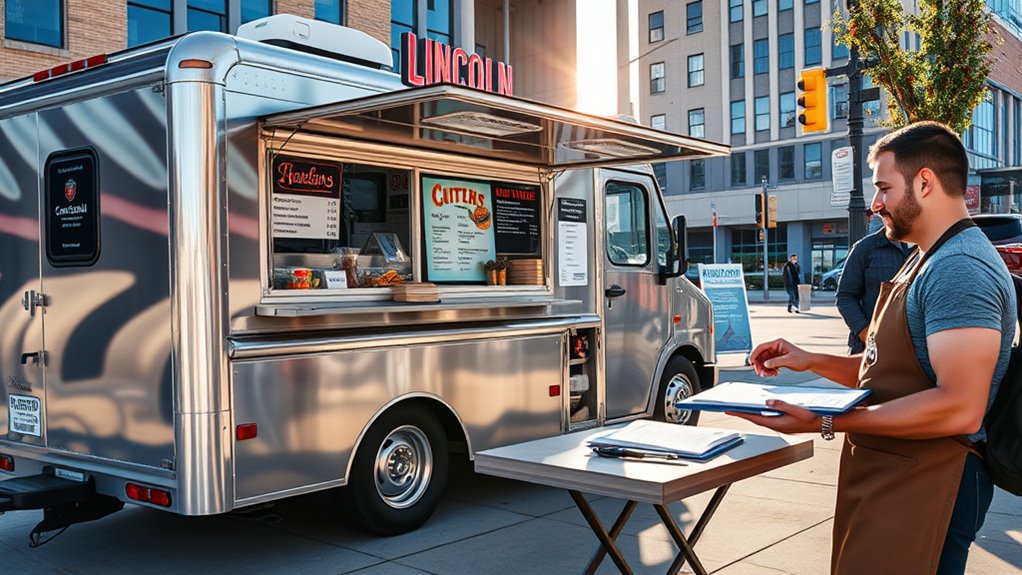
Getting your food truck up and running in Lincoln, Nebraska, requires understanding the permitting process and securing the necessary certifications. First, you need a Mobile Food Unit Permit from the city, along with a Food Establishment Permit from the Lincoln-Lancaster County Health Department. If you plan to operate on public property, you’ll also need a Food Truck Program Permit from the City Clerk’s Office. For short-term events, temporary permits are available, either for single or multiple occasions. Before applying, you must pass health and fire inspections, ensuring your truck meets safety standards. Additionally, you or your key staff need a Food Protection Manager Certification, such as ServSafe. Operating from a licensed commissary kitchen is mandatory for food storage and prep, and all employees must hold valid permits. Complying with local regulations is essential to avoid fines or shutdowns and to ensure your business operates smoothly. Understanding local building codes and permits helps streamline the approval process and avoid potential delays.
Navigating Costs and Fees for Food Truck Operations
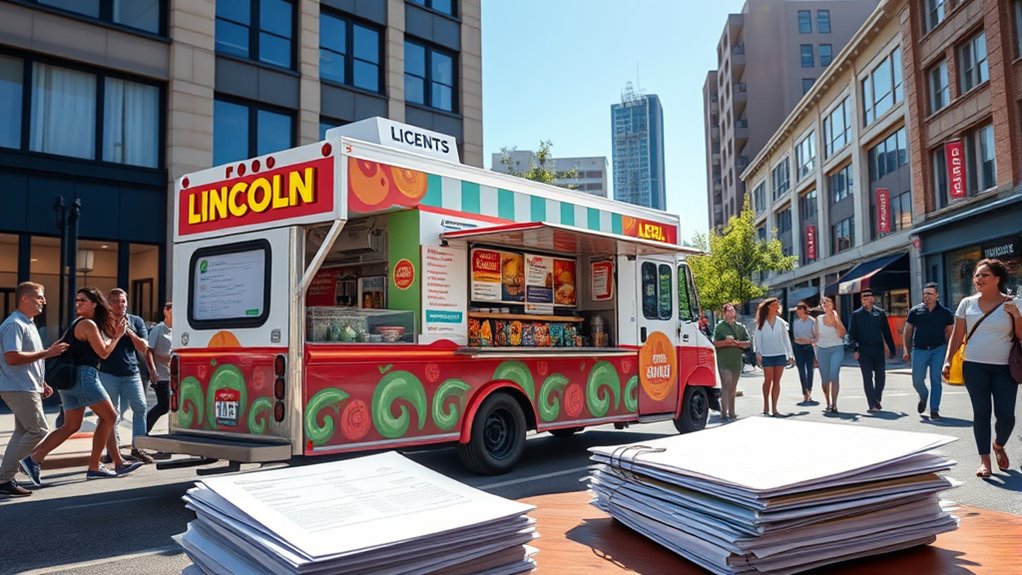
Understanding the costs associated with operating a food truck in Lincoln, Nebraska, is essential for planning and budgeting effectively. Starting costs for a new, fully equipped truck range from $85,000 to $175,000, depending on customization. Buying a used truck can reduce initial expenses, but custom equipment may increase costs. Additional start-up expenses, including permits, insurance, and inventory, typically total $5,000 to $20,000 in the first year. Renting a truck costs between $46,700 and $187,440 annually. You’ll also need to budget for commissary kitchen fees, which are mandatory. Recurring costs include fuel, maintenance, labor, and inventory, with monthly expenses ranging from a few hundred to several thousand dollars. Be prepared for permit fees, health inspections, and occasional equipment repairs to keep your operation running smoothly. These expenses should be carefully tracked to ensure your business remains profitable over time. Incorporating sound financial planning can help manage your costs effectively and sustain your food truck venture.
Finding the Best Locations and Parking Regulations in Lincoln
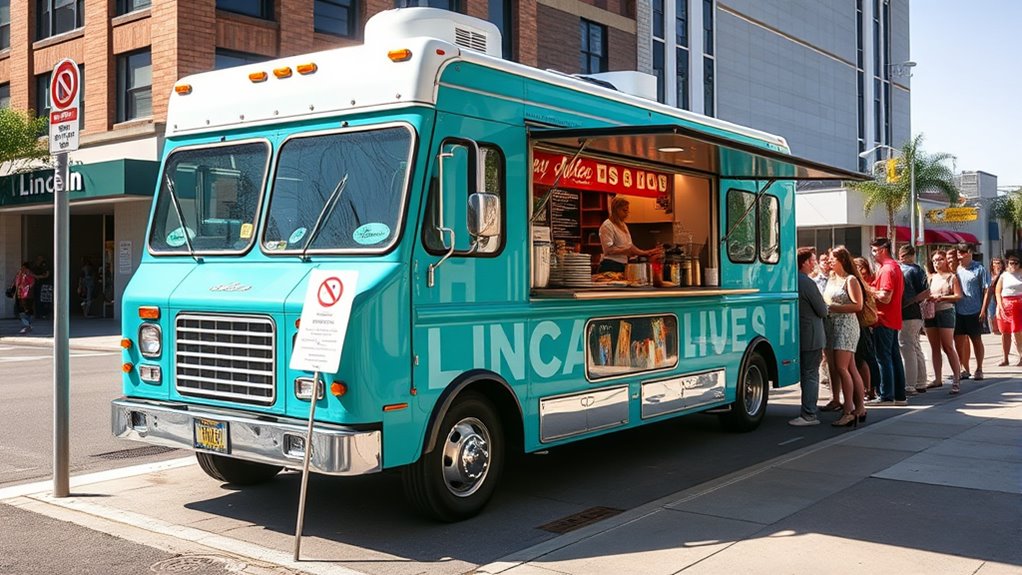
Locating your food truck in Lincoln requires careful attention to parking regulations and zoning rules. You must keep at least 300 feet away from any existing restaurant or food establishment to avoid violations, fines, or permit loss. For downtown operations, you can reserve metered parallel parking spots by submitting a Vendor Truck Application to Parking Services and paying additional fees. Food trucks can park in B-3 and B-4 zones, but street parking is restricted on high-speed roads, emergency snow routes, and during certain times on residential streets. Always use the city’s parking map to identify legal spaces, including metered and non-metered options. Ensuring compliance with these rules helps you operate smoothly while avoiding legal issues and fines. Additionally, understanding the parking regulations for different zones can help optimize your location choices and ensure your business remains compliant.
Crafting a Menu That Complies With Local Regulations and Appeals to Customers
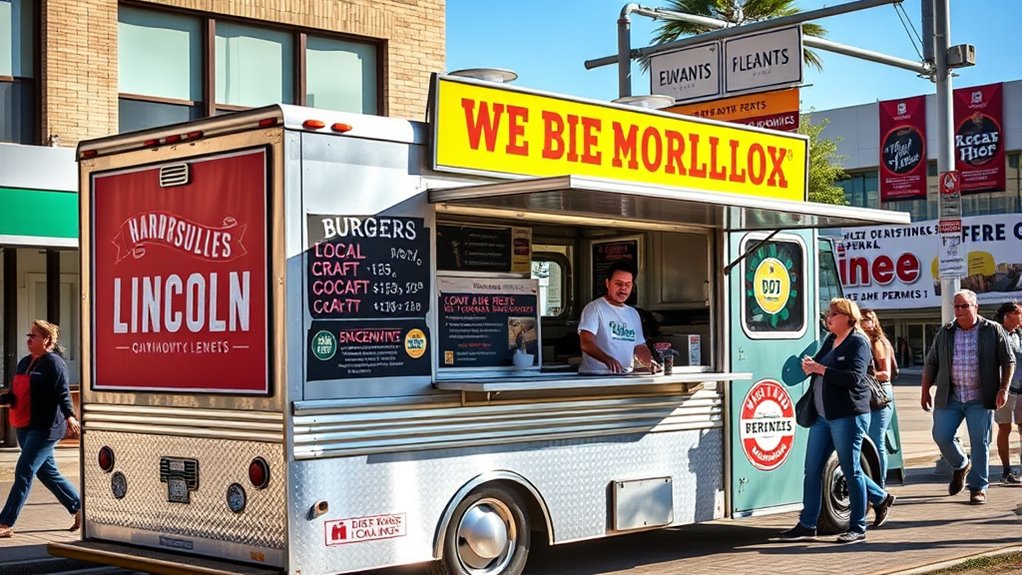
Crafting a menu that complies with local regulations while appealing to customers requires careful planning and attention to detail. You must obtain a valid Food Establishment Permit from the Lincoln-Lancaster County Health Department before opening. Your menu items should follow the Nebraska Food Code, ensuring proper handling, storage, and preparation. If using appliances like fryers or grills that produce smoke or grease vapor, you’ll need additional permits and fire inspections. All employees are required to get Food Handler Permits within 30 days. Focus on fresh, locally sourced ingredients and seasonal items to attract health-conscious customers, but avoid hazardous foods or allergens that could violate regulations. Keeping your menu limited and efficient helps maintain quality, safety, and quick service within your food truck’s space. Additionally, menu planning should align with local health and safety standards to ensure compliance and avoid potential violations. Incorporating food safety protocols into your menu development can further help meet regulatory requirements and safeguard customer health.
Effective Marketing Strategies to Launch and Grow Your Food Truck Business
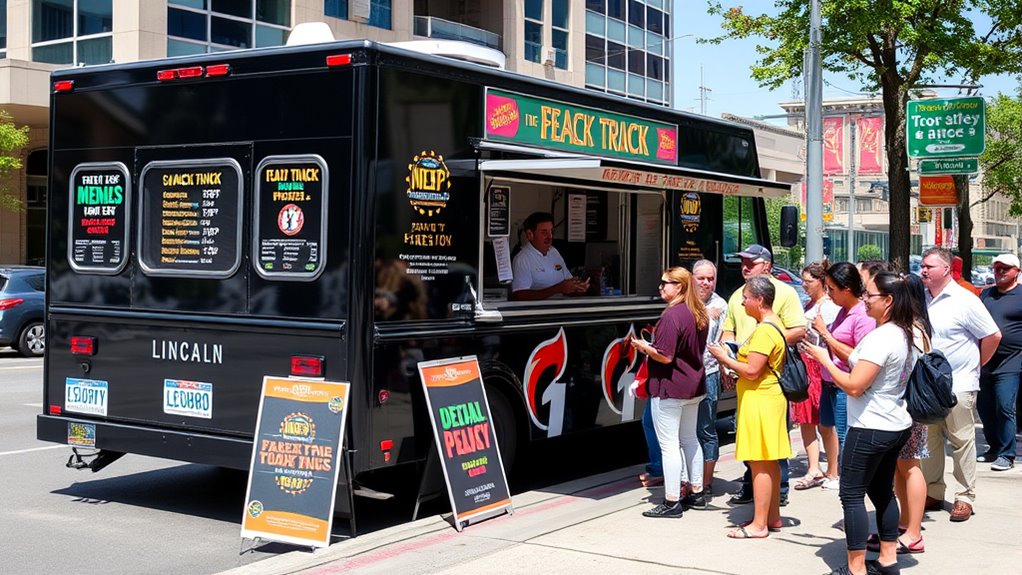
Launching and growing your food truck business requires a strategic approach to marketing that combines digital tools, community engagement, and brand consistency. Social media is essential—75% of food trucks use Facebook, and campaigns on these platforms can boost sales by 20%. Nearly 40% of customers discover trucks through social media ads, and active online engagement can lead to 15% higher spending. Participating in local events and festivals increases visibility by up to 80%, while building partnerships fosters customer loyalty. Data analytics and GPS tracking help optimize location, targeting high-traffic areas for better sales. Loyalty programs and email marketing encourage repeat visits, with over half of trucks seeing a 30% rise in repeat business. Focus on targeted messaging to Millennials and Gen Z to strengthen your brand presence and grow sustainably. Digital presence and review responsiveness also play a key role, with higher customer satisfaction linked to active online management. Incorporating organization and planning strategies can further enhance your marketing efforts and operational efficiency.
Frequently Asked Questions
Are There Specific Insurance Requirements for Operating a Food Truck in Lincoln?
You need to meet specific insurance requirements to operate a food truck in Lincoln. Nebraska mandates minimum coverage limits for auto and liability insurance, especially if you sell alcohol or handle sensitive data. You should also consider additional coverage like equipment, spoilage, and contamination. Shop around for policies that comply with state regulations, and compare quotes to find the best coverage for your business needs.
How Do I Handle Health Inspections and Compliance Documentation?
Think of health inspections as a dance you must master to stay in step with regulations. You’ll schedule initial and annual inspections with Lincoln-Lancaster County, keep permits current, and guarantee your staff has food safety certifications. Always display permits and maintain cleanliness, sanitation, and proper food storage. Regularly review inspection reports online, address violations promptly, and stay compliant to keep your food truck thriving in Lincoln’s vibrant scene.
Can I Operate My Food Truck in Residential or Restricted Zones?
You can’t operate your food truck in residential or restricted zones in Lincoln without special permits. The city primarily allows food trucks in commercial districts like Downtown, and operating near homes, schools, or parks usually requires additional approval. You must also follow parking rules and avoid non-metered spaces with restrictions. To stay legal, get the necessary permits, and check local zoning laws before setting up your truck in these areas.
What Are the Restrictions on Serving Alcohol From a Food Truck?
Imagine serving drinks from your food truck, but suddenly, a flashing light or a guardrail blocks your path. Serving alcohol is tightly regulated—you must obtain a liquor license, display it visibly, and make certain your manager has the proper certification. Operating hours are restricted, employees must be over 21, and you can’t serve minors. Zoning laws and safety codes may also limit where and how you serve alcohol, keeping you on your toes.
How Do I Cancel or Transfer Permits if I Close or Sell the Truck?
When you close or sell your food truck, you need to notify the relevant agencies, like the City Clerk’s Office and the Health Department, and submit a formal cancellation or transfer application. You must settle any outstanding fees, and if selling, get a new permit for the buyer, including health inspections and certifications. Keep documentation of the transfer or closure to avoid fines, and guarantee all requirements are properly followed.
Conclusion
Starting your food truck in Lincoln is a rewarding journey with a few gentle hurdles along the way. By understanding permits, managing costs, selecting ideal spots, and crafting an appealing menu, you’ll set yourself up for success. With thoughtful marketing, you’ll naturally attract loyal customers. Remember, each step is like a small nudge guiding you toward a thriving venture. Embrace the process, and soon you’ll find your place on Lincoln’s vibrant food scene.
